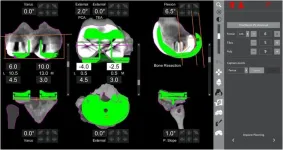(Press-News.org) If you hate the rain, you have something in common with wolf spiders.
Researchers at the University of Cincinnati found that wolf spiders can’t signal others or perceive danger from predators as easily on rain-soaked leaves compared to dry ones. Even communicating with would-be mates is harder after it rains.
The study was published in the Journal of Insect Behavior.
Biologists in UC’s College of Arts and Sciences studied Schizocosa ocreata, a wolf spider found across much of the United States. Males respond to chemical signals from females by using a combination of visual and vibratory signals for courtship.
Spiders don’t have ears, but sense sound in vibrations using specialized sense organs in their eight legs. The vibrations from sound carry much better in dry leaves.
Wolf spiders are especially attuned to the calls of predatory birds like blue jays that feast on spiders, particularly during nesting season when their offspring eat virtually nothing else, lead author and UC Professor George Uetz said.
“Birds preferentially feed spiders to their offspring because spiders have 50 times the amount of taurine than insects,” Uetz said. “And taurine is critical for the development of the hippocampus of nestlings’ brains. The hippocampus is associated with spatial memory, which is really important for birds.”
The spring nesting season coincides with the spiders’ mating season. Male wolf spiders are especially vulnerable to birds when they try to woo a mate with a flashy display, which involves drumming their exaggeratedly furry front legs on the leaves in front of them.
The UC study found that male spiders become motionless and “freeze” when a blue jay calls nearby. And they stay frozen longer on dry leaves than on wet ones, possibly because the dry leaves provide a better early warning than wet ones that dampen vibrations.
Uetz said the striped black and brown spiders have remarkable camouflage when they remain motionless.
“If they remain still, they just disappear,” he said.
“Like lots of predators, blue jays are visually oriented,” Uetz said. “They’re very visually acute. For them, movement really is the key.”
With climate change increasing the frequency and duration of spring rains, wolf spiders will face increasing ecological challenges, Uetz said.
“Spring is coming a little earlier. What we’re seeing is there’s a shift in the life cycle of the spiders,” Uetz said. “If global warming shifts the annual life cycle of the spiders, that will push them out of synchrony with the nesting season of the birds, which is more closely tied to daylight cues.”
Wet leaves didn’t discourage male spiders from courting females. Male spiders increased visual signaling to compensate for the inability to use vibrations. But spiders that could use dry leaves to communicate to females had more mating success.
UC graduate Rachel Gilbert, a study co-author, said spiders can be important bellwethers of environmental change.
“Spiders are very important to local ecosystems, both as a predator of insects and as a major food source to larger animals like birds,” she said.
The study was funded by grants from the National Science Foundation.
END
Rain can spoil a wolf spider’s day, too
Wolf spiders change their mating strategy after it rains
2024-01-17
ELSE PRESS RELEASES FROM THIS DATE:
Independent dispute resolution of no surprises act financially unviable for radiology
2024-01-17
Leesburg, VA, January 17, 2024—According to the American Journal of Roentgenology (AJR), the No Surprises Act’s (NSA) independent dispute resolution (IDR) process would be financially unfeasible for a large portion of out-of-network (OON) claims for hospital-based specialties—more so for radiologists than other specialists.
“Although the NSA enacted important patient protections, IDR fees limit clinicians’ opportunities to dispute payer-determined payments and potentially undermine their bargaining power in contract negotiations,” ...
AMS presidential forum to address “Climate Science as Service to Society”
2024-01-17
[Boston, MA—January 17, 2024] The American Meteorological Society (AMS) will open its 104th Annual Meeting with a Presidential Forum on how to advance society’s acceptance and use of climate science. Distinguished atmospheric scientist Dr. Kerry Emanuel will moderate a “fireside chat” with Monica Medina, President and CEO of the Wildlife Conservation Society and former Deputy Assistant Secretary at the State Department, and Bob Inglis, Executive Director of RepublicEn.org and former congressman from South Carolina. The Forum, with opening remarks by AMS President ...
Researchers find anti-HIV drugs may prevent complications from bacterial sepsis
2024-01-17
Bacterial infections can lead to the formation of abscesses — pockets of dead cells and debris surrounded by inflammatory immune cells. Bacteria multiply within abscesses, causing more inflammation and further damage to surrounding tissues. In severe cases, these immune reactions spread across the body, resulting in life-threatening organ failure, or sepsis. But how these abscesses form and what can be done to prevent them were previously not well understood.
Using preclinical models, investigators from Brigham and ...
The heat is on: UMass Amherst scientists discover southern Africa’s temps will rise past the rhinos’ tolerance
2024-01-17
January 17, 2024
The Heat is on: UMass Amherst Scientists Discover Southern Africa’s Temps Will Rise Past the Rhinos’ Tolerance
New research shows that rising temperatures caused by climate change are impacting the remaining black and white rhinoceros populations on the African continent, suggests taking steps to mitigate impact now
AMHERST, Mass. – Southern Africa contains the vast majority of the world’s remaining populations of both black and white rhinoceroses ...
Next generation spinal fusion goes "meta"
2024-01-17
A civil engineer at the University of Pittsburgh is applying his expertise in bridges and infrastructure to develop new materials that better treat spinal injury, repair, and recovery. Amir Alavi’s proposal received a $557,000 boost from the National Institutes of Health to test the first “metamaterial” orthopedic implants.
With an estimated 342,000 procedures per year in the U.S.1, interbody spinal fusion is a popular procedure to treat a range of spinal pain and injuries, from herniated discs and degenerative diseases to trauma. Interbody fusion cages are spinal implants that are used in most of ...
Study identifies new findings on implant positioning and stability during robotic-assisted knee revision surgery
2024-01-17
HUNTINGTON, W.Va. - An innovative study at Marshall University published in ArthroplastyToday explores the use of robotic-assisted joint replacement in revision knee scenarios, comparing the pre- and post-revision implant positions in a series of revision total knee arthroplasties (TKA) using a state-of-the-art robotic arm system.
In this retrospective study, the orthopaedic team at the Marshall University Joan C. Edwards School of Medicine and Marshall Health performed 25 revision knee replacements with a robotic assisted computer system. The procedure involved placing new implants at the end of the thighbone and top of the shinbone with the computer's aid to ensure ...
New vaccine design uses immunity against influenza to offer faster protection against emerging pathogens
2024-01-17
RIVERSIDE, Calif. -- After COVID vaccination, it usually takes weeks for our bodies to develop protective antibody responses. Imagine, however, a vaccine that speeds up the production of antibodies against SARS-CoV-2, the virus that spreads COVID-19.
A research team led by Rong Hai, an associate professor of microbiology and plant pathology at the University of California, Riverside, has developed such a vaccine by using preexisting immunity to a separate virus (the influenza virus) to help kickstart the process of making antibodies ...
How do controllable risk factors for dementia vary by race, ethnicity?
2024-01-17
MINNEAPOLIS – Approximately 23% of people diagnosed with Alzheimer’s disease or another related dementia in their 60s and later have cases that can be explained by controllable risk factors such as high blood pressure, diabetes, physical inactivity, and too little or too much sleep, and that percentage varies depending on race and ethnicity, according to a new study published in the January 17, 2024, online issue of Neurology®, the medical journal of the American Academy of Neurology. When including APOE ε4, a gene variant associated with the strongest genetic risk for late-age Alzheimer’s disease, the study found about a third of cases could be explained ...
For people with migraine, feelings of stigma may impact disability, quality of life
2024-01-17
MINNEAPOLIS – Migraine can impact many aspects of a person’s life, but less is known about how feelings of stigma about the disease affect quality of life. For people with migraine, these feelings of stigma were linked to more disability, increased disease burden and reduced quality of life, according to new research published in the January 17, 2024, online issue of Neurology®, the medical journal of the American Academy of Neurology.
“Stigma is common where the disease is not readily apparent to others, and there is indication that it could be especially relevant for those living with migraine,” said study author Robert Evan Shapiro, ...
NIH-developed HIV antibodies protect animals in proof-of-concept study
2024-01-17
WHAT:
Three different HIV antibodies each independently protected monkeys from acquiring simian-HIV (SHIV) in a placebo-controlled proof-of-concept study intended to inform development of a preventive HIV vaccine for people. The antibodies—a human broadly neutralizing antibody and two antibodies isolated from previously vaccinated monkeys—target the fusion peptide, a site on an HIV surface protein that helps the virus fuse with and enter cells. The study, published in Science Translational Medicine, was led by the Vaccine Research Center (VRC) at the National Institute of Allergy and Infectious Diseases (NIAID), part of the National Institutes of Health.
Antibodies ...
LAST 30 PRESS RELEASES:
Research alert: Understanding substance use across the full spectrum of sexual identity
Pekingese, Shih Tzu and Staffordshire Bull Terrier among twelve dog breeds at risk of serious breathing condition
Selected dog breeds with most breathing trouble identified in new study
Interplay of class and gender may influence social judgments differently between cultures
Pollen counts can be predicted by machine learning models using meteorological data with more than 80% accuracy even a week ahead, for both grass and birch tree pollen, which could be key in effective
Rewriting our understanding of early hominin dispersal to Eurasia
Rising simultaneous wildfire risk compromises international firefighting efforts
Honey bee "dance floors" can be accurately located with a new method, mapping where in the hive forager bees perform waggle dances to signal the location of pollen and nectar for their nestmates
Exercise and nutritional drinks can reduce the need for care in dementia
Michelson Medical Research Foundation awards $750,000 to rising immunology leaders
SfN announces Early Career Policy Ambassadors Class of 2026
Spiritual practices strongly associated with reduced risk for hazardous alcohol and drug use
Novel vaccine protects against C. diff disease and recurrence
An “electrical” circadian clock balances growth between shoots and roots
Largest study of rare skin cancer in Mexican patients shows its more complex than previously thought
Colonists dredged away Sydney’s natural oyster reefs. Now science knows how best to restore them.
Joint and independent associations of gestational diabetes and depression with childhood obesity
Spirituality and harmful or hazardous alcohol and other drug use
New plastic material could solve energy storage challenge, researchers report
Mapping protein production in brain cells yields new insights for brain disease
Exposing a hidden anchor for HIV replication
Can Europe be climate-neutral by 2050? New monitor tracks the pace of the energy transition
Major heart attack study reveals ‘survival paradox’: Frail men at higher risk of death than women despite better treatment
Medicare patients get different stroke care depending on plan, analysis reveals
Polyploidy-induced senescence may drive aging, tissue repair, and cancer risk
Study shows that treating patients with lifestyle medicine may help reduce clinician burnout
Experimental and numerical framework for acoustic streaming prediction in mid-air phased arrays
Ancestral motif enables broad DNA binding by NIN, a master regulator of rhizobial symbiosis
Macrophage immune cells need constant reminders to retain memories of prior infections
Ultra-endurance running may accelerate aging and breakdown of red blood cells
[Press-News.org] Rain can spoil a wolf spider’s day, tooWolf spiders change their mating strategy after it rains






